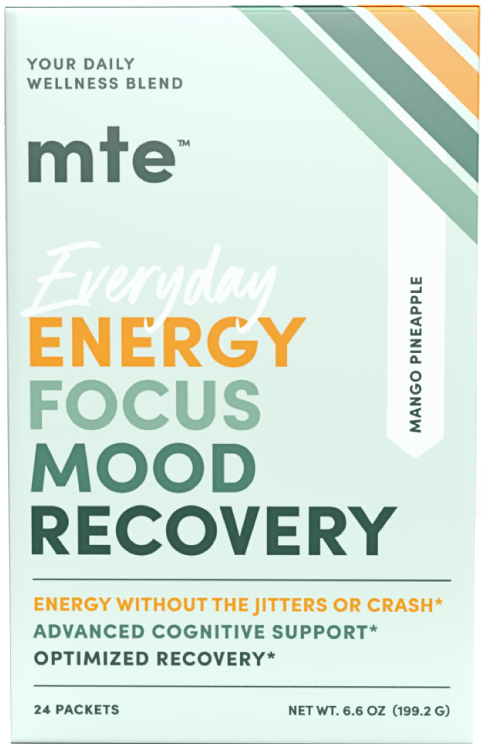
Energy Without the Crash: How Paraxanthine is Revolutionizing the Caffeine Game
Caffeine is the world’s most popular energy booster. Most of us rely on caffeine to help kickstart our mornings, power us through the workday, and fight off fatigue when we need to stay focused.
One cup of coffee can be just what you need to get that little boost of energy and focus. However, drink one too many, and you can turn into an overstimulated mess faster than a toddler on a sugar high.
Too much caffeine can lead to tension, nervousness, jitters, crash, digestive problems, increased blood pressure, and other side effects.
So, does that mean you should completely cut off caffeine from your diet?
Probably not.
But you do need to moderate your caffeine intake.
So, let’s see why excessive caffeine is bad for your health and how moderation can help you avoid the pitfalls of consuming too much.
We also want to discuss theacrine – the perfect caffeine alternative that promotes a more sustainable energy boost, even better than moderate caffeine.
Let’s dive in!
How Does Caffeine Help Us Stay Awake & Focused?
After caffeine gets absorbed in the stomach, it enters the bloodstream and throughout the body. When it reaches the central nervous system, it binds to receptors used by neurotransmitters that signal tiredness/fatigue, preventing communication with those receptors. That's why you feel more awake and alert when you consume caffeine.
Caffeine also promotes the activity of key neurotransmitters that manage mood, motivation and focus. Their effects contribute to the overall energy-promoting benefits of caffeine.
Lastly, caffeine triggers the release of hormones responsible for how we respond to stress and danger. This activity initiates the fight-flight-freeze response, elevating blood pressure, heart rate and metabolism.
While levels of pro-stress chemicals are high, we feel more wakeful, alert and focused because the brain tries to keep everything running at 100% to overcome the “danger.”
Luckily, there is no danger. However, if you consume too much caffeine, you risk experiencing pounding heart, jitters, a crash, and other side effects.
Let’s see why.
Perils of Excessive Caffeine Consumption
The US Food and Drug Administration (FDA) and most other health agencies state that consuming up to 400mg of caffeine per day is safe for healthy adults. That equates to four to five standard (8 fl oz) cups of coffee.
But many people fail to realize that caffeine also exists in sodas, teas, chocolate, dietary supplements, and many other products. So, going over the recommended daily limit is easier than you think.
Excessive caffeine consumption can lead to many side effects, including:
- A crash
- Poor mood
- Jitters
- Nervousness
- Tremors or shaking
- Increased heart rate and blood pressure
- Headaches
- Digestive issues
- Nausea
- Sleep/wake cycle dysfunction
Why Does Caffeine Cause a Crash?
We mentioned that caffeine stops all the I'm-tired neurochemical activity in the central nervous system, which promotes our energy levels. However, a caffeine boost doesn’t last forever.
After three to four hours, our body clears most of it, meaning that all those blocked receptors are now open. And all those stored up neurotransmitters that have been screaming into the abyss are finally heard by your brain all at once.
I'M TIRED! LIKE, VERY TIRED!
This is what most people perceive as a crash, and it can be accompanied by a lack of motivation, nervousness, poor ability to focus, and other side effects.
Why Do You Feel Anxious & Jittery After Coffee?
When we overindulge in caffeine, we often feel anxious and jittery. These symptoms occur because caffeine acts as a nervous system energizer, triggering the release of pro-focus, get-it-done chemicals present in stress responses.
We already mentioned that caffeine triggers the OH NO response in our body, which can make us feel restless and jittery. Caffeine also increases blood pressure and heart rate as your body prepares to deal with the danger you gaslit it into thinking is coming, causing further unease and reactivity.
In addition to an energy boost, coffee affects levels of the main neurotransmitters associated with motor control, learning and memory. An overstimulated brain can disrupt the balance of these neurotransmitters, causing involuntary muscle contractions. As a result, some people experience shaking and tremors after drinking too much caffeine.
It’s important to note that some individuals may be more sensitive to the effects of caffeine than others, which can increase their likelihood of experiencing these adverse sensations.
Caffeine & Cardiovascular Health
The relationship between caffeine consumption and cardiovascular health is somewhat complex. While some studies suggest that moderate caffeine intake benefits cardiovascular health, consuming too much caffeine is definitely not good for your heart.
Caffeine excites the nervous system, raising your heart rate and blood pressure. That’s usually not a problem because most people drink moderate amounts of caffeine, and the energizing effects typically subside after three hours.
It’s important to note that people with high blood pressure should avoid high doses of caffeine because it may put an additional strain on their cardiovascular system.
Lastly, most people consume caffeine in the form of coffee, sodas, or energy drinks. These caffeinated beverages also contain a lot of sugar, which could have additional adverse effects on your cardiovascular health.
Does Caffeine Cause Headaches?
Drinking caffeine has long been believed to cause headaches, but is it actually true? It turns out that the relationship between caffeine and headaches is complex, and the answer is not a simple yes or no.
Some research suggests that regular caffeine consumption could increase the chances of experiencing headaches and even migraines. That’s because caffeine alters blood flow to the brain, which can trigger headaches.
On the other hand, numerous studies suggest that moderate caffeine intake could help relieve headaches. That’s because caffeine constricts blood vessels in the brain and helps reduce inflammation, alleviating pressure.
The most important thing to remember is that people can react differently to caffeine. And while some people can experience headaches after drinking caffeine, others may grab a cup of coffee to help them deal with a migraine. However, it’s vital to practice moderation because the more caffeine you consume, the higher the chances it will cause adverse effects like headaches.
Caffeine & Digestive Issues
If that first sip of coffee has you running for the bathroom, there is a good reason behind it. Coffee has laxative properties that stimulate your gastrointestinal tract.
Drinking a moderate amount of coffee can help digestion and stimulates regular bowel movements. However, drink too much coffee, and you may experience heartburn, acid reflux, upset stomach, diarrhea, nausea, and other digestive problems.
Some people experience digestive issues after drinking caffeinated beverages because they can stimulate the production of stomach acid and irritate the lining. In addition, other compounds found in coffee could cause muscle contractions, leading to abdominal pain and cramps.
People sensitive to caffeine or acidic foods are more likely to experience digestive issues after consuming caffeine or caffeinated beverages. Many people with IBS do not react well to coffee.
Caffeine & Sleep Health
Not being able to get enough rest at night is one of the signs you are consuming too much caffeine.
That’s because caffeine messes with your natural circadian processes, which play a vital role in sleep control and deep sleep. In addition, caffeine affects levels of other hormones and neurotransmitters that can interfere with you trying to stop thinking about work once the lights go off.
Case-in-point: those pro-stress hormones block I'm-tired signals, but they also hamper production of the neurotransmitter that tells your body it's time to go to bed for the night. When your brain doesn’t synthesize enough of this sleep-promoting hormone, it becomes much harder to fall asleep at night.
According to research, too much caffeine can make it harder to fall asleep, reduce total sleep time, decrease sleep efficiency, and impair perceived sleep quality.
Keep in mind that your body needs 8-10 hours to eliminate caffeine, which is why it's likely to interfere with sleep if you consume it in the afternoon.
Is Moderation Really the Key?
Yes – moderation is the key to safe caffeine consumption. It’s essential to figure out the right amount of caffeine your body needs for optimal functioning and be aware of the potential risks of consuming too much.
A comprehensive review has found that moderate caffeine consumption is safe for healthy adults. In contrast, people who are pregnant, sensitive to caffeine, suffer from chronic conditions, and other vulnerable groups should limit their caffeine intake.
Keep in mind that while 400mg of caffeine per day is the hard limit, some people may experience side effects even with lower doses. However, if you drink one to two cups of regular coffee per day, you should be good.
Now, here’s where things get a little fuzzy.
Over time, your body can become accustomed to the effects of caffeine. That means you need to consume a higher dose to achieve the same energy-boosting benefits because caffeine habituates as your body adapts to the regular consumption of caffeinated drinks.
While moderation could prevent the adverse effects of excessive caffeine consumption, it may not be sustainable in the long run. That’s because you’ll need more and more caffeine to get the same effects, making it less efficient.
So, is there a better way to boost energy than caffeine?
Absolutely!
Meet Paraxanthine: The Perfect Caffeine Alternative
Paraxanthine might sound like a new-wave, high-tech compound, but it’s actually just a natural byproduct that is made when we digest caffeine.The high-tech part is where it had to be synthesized to bring out into the real world, because previously we could only observe it in lab settings. But this naturally-derived nootropic has the potential to boost energy, stamina, metabolism, and cognitive performance without the downsides of caffeine.
Paraxanthine promotes wakefulness as well as (if not better than) equivalent doses of caffeine, but in a gentler way that promotes balanced levels of neurochemicals and clear communication between important systems. On top of that, it doesn’t mess with your heart, sleep, mood, or cause anxiety and jitters. You don’t have to take our word for it; find links to a bunch of really interesting paraxanthine benefits and side effects studies in our deep dive articles:
So, no question - there are healthy alternatives to caffeine; you just have to find the right natural energy booster as a substitute. This is why we’ve created MTE – a unique greens powder-form supplement withparaxanthine and other nootropics, adaptogens, and superfoods that work synergistically, acting as a tailwind to help us feel and perform at our best.
So, if you’re running on empty and looking to fill the tank with the right fuel, you should try MTE and experience all the benefits of your new daily wellness companion.



